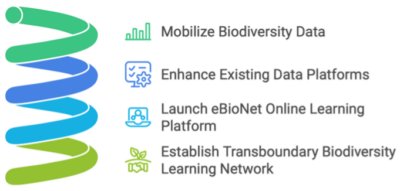Association for Water and Rural Development (AWARD) 2025
Biodiversity Systems Management and Analytics for the Restoration of Transboundary Rivers of South Africa, Mozambique and Eswatini (BIO-SMART Phase 2)
Project Details
Last Updated: November 7th, 2025
Background
Building on the foundation laid in BIO-SMART Phase One (JRS-funded grant in 2019), Phase Two aims to expand efforts into Mozambique and Eswatini to foster transboundary cooperation and build capacity for biodiversity and water resource management across the Inkomati River Basin. A critical focus is addressing the need for standardized transboundary datasets. Although the region is home to rich biodiversity across the South Africa-Mozambique border, data collection is often fragmented and inconsistent due to diverse practices among conservation and water management agencies. Additionally, local and regional capacity for biodiversity data management remains limited, hindering effective conservation. 
This project will address these challenges by enhancing access to standardized biodiversity data and interpretive tools, with a focus on transboundary collaboration and robust capacity building. Through initiatives like the establishment of Mozambique’s first FISHTRAC site, improvements to platforms such as INWARDS, and the launch of the eBioNet learning platform, the project will increase the availability and accessibility of crucial biodiversity data. By creating a Transboundary Biodiversity Learning Network (TBLN) for knowledge-sharing and skill development, the project aims to build long-term regional capacity. Success will be measured by the extent of data integration, engagement levels in eBioNet courses, and the establishment of sustainable transboundary networks.
BIO-SMART 2 will be led by the Association for Water and Rural Development (AWARD), supported by a number of implementing partners, including WWF-Mozambique, the Freshwater Research Centre (FRC), Rivers of Life Aquatic Health Services, and Charles Sturt University (CSU), Australia.
Project Details
The objectives of the Biodiversity Systems Management and Analytics for the Restoration of Transboundary Rivers of South Africa, Mozambique and Eswatini (BioSMART 2) project are graphically presented and described below.

Mobilize Biodiversity Data across the Lowveld River Systems
To create a unified dataset for the Lowveld River systems extending to the Mozambican coast, the project will collect and integrate biodiversity data from over 10 key institutions. This objective includes establishing Mozambique’s first FISHTRAC site, which will enable real-time tracking of aquatic species as part of the Southern African Inland Fish Tracking Program. This initiative aims to capture comprehensive ecological dynamics across the transboundary systems and address current data gaps.
Enhance Existing Data Platforms
The project will strengthen two key platforms; the JRS-funded Freshwater Biodiversity Information System (FBIS), developed by the Freshwater Research Centre, and AWARD’s Integrated Water Resources Decision Support System (INWARDS). By standardizing and populating these systems with up-to-date biodiversity and hydrological data, the project will enhance their value for decision-making and policy development across the region.
Launch the eBioNet Online Learning Platform
Built on the open-source Moodle system, eBioNet will serve as an online learning and communication platform offering both accredited and unaccredited courses. These courses will focus on freshwater biodiversity management practices and data collection methods across Eswatini, South Africa, and Mozambique. eBioNet will also function as a participant management and communication tool, fostering regional capacity-building and knowledge-sharing.
Establish the Transboundary Biodiversity Learning Network (TBLN)
To facilitate cross-border collaboration, the project will create the Transboundary Biodiversity Learning Network (TBLN). This network will provide a structured space for in-person data exchange, co-learning, and collaboration among stakeholders from the three countries. Focused on practical and task-based interactions, TBLN will support ongoing biodiversity management efforts, with a framework to monitor and encourage co-learning throughout the project.
Project Director Biography
Derick du Toit holds a postgraduate degree in ecology, a postgraduate diploma in education and a Masters degree in Environmental Education. He has worked as project manager in education reform in Namibia and South Africa specializing in environmental programmes. He has worked in the office of the Minister as technical advisor to the South African Department of Education. He has subsequently managed programmes for a number of international funders. He has authored and coauthored a number scientific papers, resource books for Namibian and Botswana educators, text books, environmental education materials, professional development resources and guidelines for water resources management. In 2001 he joined AWARD as project manager involved in project development, scientific research, training programmes, public participation facilitation, resource materials development, reporting and evaluation. He has been Assistant Director at AWARD and is currently a programme developer and manager.
